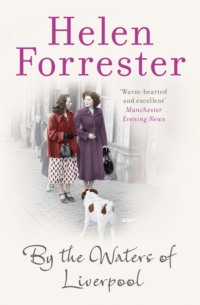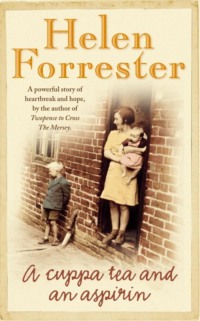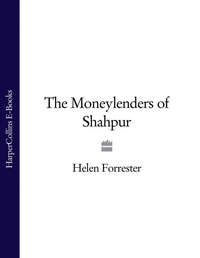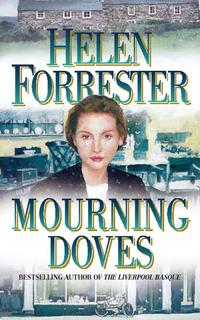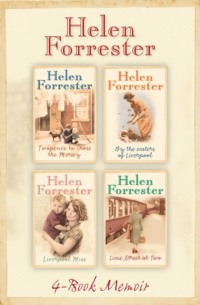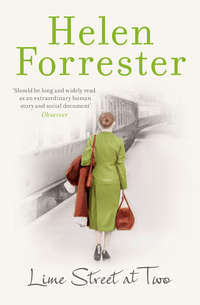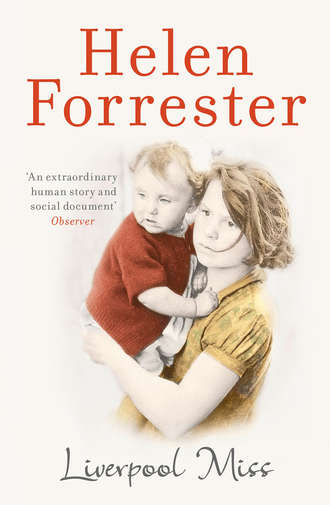
Полная версия
Liverpool Miss
I knew I looked terrible. I had seen myself once in a shop mirror. There was no greater ragamuffin in all Liverpool than me. So when Father and Mother suddenly started to talk about my getting married, I became almost hysterical. I had read fairy tales where princes materialised from all kinds of unexpected places – but the princesses were always beautiful. No prince was going to come riding by to collect a sinful, ugly hoyden like me. I had shed many bitter tears already over this fact, so successfully hammered into me by a thoughtless mother and impatient servants. I classed myself with cripples who could hope only for attractive souls, appealing to God alone.
In a paroxysm of rage all the frustration came pouring out. I raved helplessly at them, and they raved back.
I was ungrateful, thoughtless, utterly selfish. Father and Mother worked all day to maintain the family. The least I could do was to keep house. And, anyway, no matter what happened, I could not become a shop assistant. It was beneath our station.
Beside myself with fury, I ranted that Mother was working in shops. Why could not I?
The boys, with long-suffering looks, went out to play with their friends. Avril burst into tears and howled nearly as loudly as me. At such times she would go so red that even her scalp under the fine golden hair and thick scurf would flush, and she would look as if she might at any moment drop dead from apoplexy.
Fiona snatched up her ancient doll and fled upstairs.
It was night school time, but still the argument raged. Finally, I could think of no more reasons why I should go to work and I sat on a paint can, buried my face in my hands and wept uncontrollably.
Mother angrily seized some of the dishes off the table and took them into the kitchen. Father folded up the newspaper into a neat small square, a habit he had. Suddenly the room was quiet, except for miserable sobs from Avril, sitting on the floor in a corner, sturdy small legs spread in front of her. Occasionally, she would kick the tiles with her heels, as if to emphasise her misery. My own sobs were almost silent; I had long ago learned to cry without drawing attention to myself.
Mother returned from the kitchen and Father said rather carefully to her, ‘Perhaps if Helen went to this shop for the interview and saw how much work a place like that would expect from her, she might realise that she is better off at home. Small places like that usually squeeze the very life blood out of their people.’ He ran one finger along the newspaper’s folds to neaten it, while I looked up quickly at Mother.
I swallowed a sob. Here was a tiny opening. I was sure I could do any amount of work. I conveniently ignored the fact that my physical condition was so poor that quite small exertions could make me dizzy, and each month I had to face a day of almost unbearable pain.
Between sniffs, I begged Mother in watery, meek tones, to let me do as Father suggested.
Mother had wearied herself with her tirade. She sat down suddenly and was quiet. Then she said resignedly that she had no work for the next day, so she supposed she might as well take me to see the shop. Fiona could look after Edward, since the following day was Saturday.
I had not considered that Mother might accompany me, and I had expected to have to face the interview alone. This had worried me, because I had no idea how one should behave or what one should say in such a situation, particularly as I did not want to give any indication of the kind of life we led. I felt instinctively that I would stand a better chance of getting work if it appeared that I came from a stable working class or lower middle class home, with less well-born parents than I had. What kind of an impact on a small businessman would Mother have, a lady who spoke ‘with ollies in her mouth’?
I sighed, but made no objection to her coming. I said instead, ‘I’d have to make myself look respectable, somehow.’
I looked at Mother hopefully. She was still dressed in her black business frock, though she had taken off her shoes and stockings and wore father’s old bedroom slippers on her feet. Her face looked haggard under her make-up and her hair, which I had waved the night before, was ruffled and untidy.
Mother returned my look. ‘Yes, you would,’ she replied, so sharply that it sounded like an implied threat and made me jump apprehensively.
I was as tall as Mother, though with a much slighter frame, and after surveying me for a moment, she said I could borrow the dress she was wearing. Since it would be Saturday the following day, I could also borrow Fiona’s black woollen stockings and black, flat-heeled shoes; Fiona was not consulted, and was very grumpy when she discovered what had been agreed. ‘You’ll tread them out,’ she complained. ‘Your feet are too big.’
‘I’ll be very careful,’ I promised, as I recklessly washed my hair and then the rest of me in a quart of hot water in the tin basin, and used up the last sliver of soap we possessed. There would be a row with the boys in the morning about the lack of soap, but it could be endured.
I borrowed from Mother the only pair of scissors we had. She carried them in her handbag, so that they could not be misused, but even so, they were blunt and the nails on my right hand had to be finished off by biting them. Toenails were always left to grow until they broke off, and sometimes they looked like cruel, yellow claws before they finally cracked off.
The scissors were too small to cut hair, so I combed my unkempt locks with the family comb, also normally carried in Mother’s handbag, and hoped they would stay off my face until the interview was over. When I received some wages, I promised myself, I would ask Mother if I could buy some hair clips.
Even after these efforts, I must have looked very odd in a black dress too long and too looose for me and without an overcoat, though it was late February and the weather was damp and chilly.
Full of hope, though shivering with cold, I trotted along beside Mother through the misty morning, past the Rialto Cinema and Dance Hall with its tawdry posters, and the dim outline of the cathedral, to the sweetshop.
It was a very little shop, in a shabby block of other small shops and offices. Its window, however, sparkled with polishing despite the overcast day. Through the gleaming glass I could dimly see rows of large bottles of sweets and in front of them an arrangement of chocolate boxes, all of them free of dust. Beneath the window, a sign in faded gold lettering advertised Fry’s Chocolate.
Mother, who had not spoken to me during the walk, paused in front of the shop and frowned. Then she swung open the glass-paned door and stalked in. I followed her, my heart going pit-a-pat, in unison with the click of Fiona’s shoes on the highly polished, though worn, linoleum within.
An old-fashioned bell hung on a spring attached to the door was still tinkling softly when a stout, middle-aged woman with a beaming smile on her round face emerged through a lace-draped door leading to an inner room.
‘Yes, luv?’ she inquired cheerfully.
‘I understand that you wrote to my daughter about a post in your shop?’ Mother’s voice was perfectly civil, but the word ‘post’ instead of ‘job’ sounded sarcastic.
The smile was swept from the woman’s face. She looked us both up and down uncertainly, while I agonised over what Mother might say next.
‘Helen?’ the woman asked, running a stubby finger along her lower lip.
‘Helen Forrester,’ replied Mother icily.
‘Ah did.’ The voice had all the inflections of a born Liverpudlian. She looked past Mother, at me standing forlornly behind her. Her thoughtful expression cleared, and she smiled slightly at me. I smiled shyly back.
I felt her kindness like an aura round her and sensed that I would enjoy being with her, even if she did expect a lot of work from me.
‘Have you ever worked before, luv?’ she asked me, running fingers on which a wedding ring gleamed through hair which was improbably golden.
I nodded negatively. Then cleared my throat and said, ‘Only at home.’
‘What work would Helen be expected to do?’ asked Mother, her clear voice cutting between the woman and me like a yacht in a fast wind. She had also the grace of a yacht in the wind; but the sweet-shop owner was obviously finding her more trying than graceful and answered uncertainly, ‘Well, now, I hadn’t exactly thought. I need a bit o’ help, that’s all. ’Course she’d have to wash the floor and polish it, like, every day. And clean the window and dust the stock. And when I knowed her a bit she could probably help me with serving, like. I get proper busy at weekends – and in summer the ice cream trade brings in a lot o’ kids, and you have to have eyes in the back o’ your head or they’ll steal the pants off you.’
Mother sniffed at this unseemly mention of underwear, and then nodded.
‘And what would the salary be?’
I groaned inwardly. I was sure that in a little shop like this one earned wages not a salary.
The beginning of a smile twitched at the woman’s lips, but she answered Mother gravely.
‘Well, I’d start her on five shillings, and if she was any good I’d raise it.’
Even in those days, five shillings was not much. The woman seemed to realise this, because she added, ‘And o’ course, she can eat as many sweets as she likes. But no taking any out of the shop.’
I could imagine that this was not as generous as it sounded. After a week of eating too many sweets, the desire for them would be killed and few people would want them any more.
Mother inquired stiffly, ‘And how many hours a week would she work for that?’
‘Well, I open up at half past seven in the morning to catch the morning trade, you understand. And I close up at nine in the evening.’ She paused a moment and then said, ‘But I wouldn’t need her after about seven o’clock. Me husband’s home by then, and he helps me after he’s had his tea. And I close Wednesday atternoons, so she’d have the atternoon off after she’d tidied up, like. Me husband helps me Sundays, too, so I wouldn’t want her then either.’
I wanted the job so badly that I did not care how many hours I worked, how often I scrubbed the floor. The shop seemed so lovely and warm, after our house, and I sensed that in a rough way the woman would be kind to me. I tried to will the woman to agree to take me.
A little boy burst through the shop door, leaving the bell tinging madly after him. He pushed past us and leaned against the corner of the counter.
‘Ah coom for me Dad’s ciggies,’ he announced, turning a pinched, grubby face up towards the sweet-shop owner.
‘Have you got the money?’
‘Oh, aye. He wants ten Woodbines.’ A small hand was unclenched to show four large copper pennies.
The cigarettes were handed over and the pennies dropped into the wooden till.
‘Now don’t be smoking them yourself,’ admonished the woman, with a laugh.
The boy grinned at her and bounced back to the door, his bare feet thudding. As he went through the door, he turned and gestured as if he were smoking.
‘Aye, you little gint!’ she said.
The interruption had given Mother time to make a rapid calculation. As the woman turned back to her, she said sharply, ‘There is a law about how many hours a minor can work – and, incidentally a law about selling cigarettes to minors. I am sure that over sixty hours a week – at less than a penny an hour – are far more hours than are allowed.’
The woman shrugged huffily; her eyes narrowed, giving her a cunning expression.
‘I’m sure I don’t know about that,’ she replied tartly. ‘If she doesn’t want the job she doesn’t have to take it. There’s others as will be grateful for it.’ She sniffed, and looked at me disparagingly. ‘Anyway, I wouldn’t take her. The sores on her face would put the customers off. I got to have a clean looking girl.’
I looked at her appalled, hurt to the quick. In front of our broken piece of mirror, I had carefully squeezed each pimple on my face, so that the acne was temporarily reduced to raised red blotches with a fresh, golden scab on each. I had no make-up to cover the results. But I had hoped that I looked clean.
Mother’s face flooded with angry colour. For a moment she looked like Avril in a tantrum. She cast a scornful glance at the shopkeeper, who stared back at her with her chin thrust upwards, quite unabashed.
‘Good afternoon,’ Mother snapped, as she swung round and opened the street door. The little bell tinkled crossly at being so forcibly disturbed.
‘Helen, this way.’
It was an order, and I slouched out through the doorway, closely followed by my wrathful mother.
Nine
Mother scolded sibilantly all the way home, and blamed me for wasting her time. I was too crushed and disappointed to respond.
Back I went to the kitchen and little Edward, who trotted patiently by my side, while I fumed miserably. In saner moments, I acknowledged that Mother had saved me from savage exploitation. But her motives in doing so were, to me, suspect. And as the years went by I felt that my increasing efficiency at home was daily making more certain that I stay there. Probably a few pennies of pocket money or a modicum of praise would have done much to soothe me. But everything I did was taken for granted. Failures were bitingly criticised. There was no one to turn to for consolation, except, occasionally, to Fiona.
And yet I yearned to love my parents and be loved in return, to have with them the tender relationship I had had with Grandma during the long months I had frequently spent with her during my childhood. But Grandma had vanished with the rest of my friends. In my innocence, I did not understand that my parents’ fast and extravagant life in the post-World War years had alienated every relation they had. Father’s widowed mother – the last to desert them – had left her son to learn the hard way the teachings she had failed to inculcate in him when young. She probably had no conception of the depth of our sufferings.
There is no doubt that Mother never forgave her friends for deserting her after Father went bankrupt; it was as if she declared a silent, ruthless war against her own class. The depth of her bitterness was immeasurable.
I remembered well the doll-like creatures who used to frequent our drawing room and dining room. In short, beige georgette dresses, their Marcel-waved hair covered by deep cloche hats, they teetered on high heels in and out of our old home in considerable numbers. Afternoon tea or dinner were served by a parlour maid in black and white uniform. Sometimes well-tailored young men, who also had time to waste, came to drink a cocktail or have a cup of tea.
Several times, a man vanished from the usual circle. One of the ladies would say, between puffs on a cigarette held in a long holder, ‘Gas, dahling – his lungs couldn’t stand it,’ or ‘He was loaded with shrapnel – a piece moved round to his heart. Too utterly devastating.’
I was allowed to attend the tea parties. Edith would dress me in my best frock, usually shantung silk, long white socks and brown lace-up shoes, and I would sit and nibble a piece of cake and watch the prettily dressed visitors. I soon learned that most of the men were unemployed, ex-army officers; they usually had some private means left them by more enterprising forefathers, but as prices rose their money shrank. They had no special qualifications and sought jobs as car salesmen or vacuum cleaner salesmen. One of them regularly allowed me to reach up and touch the silver plate the doctors had implanted to replace the top of his skull; another had an artificial leg which creaked when he walked. Father himself had trouble with his hands, which had been frost-bitten during his service in Russia. He also got chest pains, forerunners of the heart attacks to come.
So, perhaps my parents’ friends, bereaved, disillusioned, wounded in a war of frightful, unnecessary suffering, had so many troubles of their own that they were unable to help one of their number who had failed largely through his own inadequacies.
I was born after the war, so it was only history to me. Had I realised, when I got so cross with my parents’ ineptitude, how close it still was to them, how they had already gone through the shock of seeing the kind of life they understood crumble, I would have been much more compassionate.
One windy March evening, when the children’s need of clothing seemed particularly dire, Mother decided to write to some of her old acquaintances to ask for second-hand clothing. After all, she said bitterly to Father, the most she could lose was a three-halfpenny stamp, since she appeared to have lost any friendship there was.
When the children had gone to bed, she sat at one end of the living-room table and wrote three letters, while I sat at the other end and did my homework.
Three days later, a scented letter dropped through our letter box. As far as I could remember, it was the first letter, other than a bill, which we had received since coming to Liverpool.
Opening it was a ceremony, carried out under the eager eyes of the entire family.
‘It’s from Katie,’ said Mother, naming a gay, childless married friend, as she slit the envelope with the kitchen knife.
It contained a single sheet of notepaper wrapped round a five-pound note. Katie was sorry about us and sent the enclosed with love. Mother had found a technique for adding to our income.
Until she had exhausted every possible person she could think of, Mother wrote at least one begging letter a week. She rarely got money out of the same person twice. But she had had an enormous circle of acquaintances, and when she ran out of these she wrote to the parents of the children’s friends and also moving letters to their teachers. After that, she wrote to people whose names she had picked out of library reference books.
She learned to write eloquently of the children’s woes and her own efforts to find work. She did not mention Father in letters to strangers, perhaps to give the impression, without actually saying so, that she was widowed. She frequently passed her efforts over to me to read – one of the few times when she took me into her confidence. I had never heard of confidence tricksters and I read them admiringly, believing them to be a perfectly honourable way of earning money. After all, Grandma had always said that charity was a great virtue, and we were certainly in need.
There were many professional begging-letter writers in Liverpool at that time. Earnest gentlemen sat in their tiny bed-sitting rooms and wrote passionate appeals for help to any monied person who came to their attention. They invented whole families of starving children, aged parents in need of shoes, wives dying of tuberculosis, and so on. And they made a steady living at it. In contrast, Mother could say honestly that her children were in dreadful need, even if bad management was part of the cause of it.
Some well-to-do people, including Royalty, who were bedevilled by begging-letter writers, would send the letters to a charitable organisation in the city, with the request that they investigate the need; it was remarkable how generous people were when the need was found to be genuine. I do not recollect, however, anyone coming to investigate us as a result of one of Mother’s letters.
Thanks to the kindness of many people unknown to me, a few comforts began to trickle into the house, amongst them a second-hand iron bed for me. It was hollowed out like a hammock and it was a number of years before I acquired a mattress. I shared it for a while with Edward, but it represented my first personal gain at home since we had arrived in Liverpool. It was at least another five years before I got proper blankets and sheets for it; and lying chilled to the marrow through endless winter nights was one of the greater hardships for all the children.
Sometimes parcels of clothing or bedding arrived in response to the letters. Clothing for the younger children was almost invariably given to them and it helped to keep them tidy for school. Sometimes there was clothing which fitted Mother; men’s clothing was rarely sent, perhaps because of the difficulty of fitting. The bedding was usually bundled up with some of the clothing, ready for pawning.
Seared by disappointment, I would take the cloth-wrapped parcel to the crowded pawnbroker’s shop with its three golden balls hanging in front of it, and, after much good-natured haggling with the pawnbroker, I would receive four or five shillings, and a ticket so that I could later redeem the parcel.
The parcel was whisked away from the high, black counter and thrown up a chute to the pawnbroker’s assistant in the store room above. After a year, if the goods had not been redeemed or interest paid on the loan, the parcel would be torn open and the contents sold. So many goods were for sale that the pawnbroker’s was an excellent place to buy almost anything, from clothing and boots to an engagement ring or a bedspread or a concertina; and there were always women wrapped in shawls or in long, draggling men’s overcoats, picking through the merchandise on the bargain tables set out in front of the store on fine days.
The money raised from the pawnbroker might be used for a little extra food or, more frequently, to pacify a creditor who had threatened court procedure. Cigarettes were almost always one of the first things bought with it, and sometimes Mother would go to the cinema. She often remarked angrily that if Father could afford a drink, she could afford a cinema seat.
The local newspaper-shop proprietor, after a fierce row with me because Father owed him a whole pound for cigarettes, obtained a Court Order against us. This meant that the bill had to be paid by regular instalments set by the Court, on threat of the bailiffs selling us up if we failed to pay. This added enormously to my fears, because I had stood and watched while whole houses of furniture were sold by the bailiffs for a few shillings to settle a ridiculously small debt. Mother once bought for sixpence a superb hand-made rocking chair when there were no other bids for it.
I never knew where my parents might run up another bill or who might pounce on me, as the hapless housekeeper who had to answer the door. I had always been afraid of people who shouted, and I would stand shivering with my shoulder against the inside of the door, while someone hammered and shouted on the outside.
Once or twice I considered running away, but in those days there was no support from welfare organisations for such a runaway. And who would employ someone like me?
I once threatened to go to Grandma, but my Father said grimly that she would probably turn me away, that I should be thankful for what I had. Things would get better one of these days.
Grandma had become a loving, distant dream to me, and I was shocked beyond measure at the idea that she no longer cared. Yet I believed what Father said.
Ten
Spring had come at last. The trees lining Princes Avenue were stickily in bud; the privet hedges behind the low, confining front walls of the houses were already bursting into leaf, and the sparrows and pigeons were a-bustle with the need to mate.
I wheeled Edward down Parliament Street to the small Carnegie library in Windsor Street. A playful wind flipped dust and pieces of paper round its railings, against which women leaned, shopping bags on arm, to gossip in the pale sunshine. The soot-covered library was a handsome little building with high, arched windows which made it pleasantly light inside. Its battered books passed through my hands at the rate of about half a dozen a week and helped me to forget hunger, cold and humiliation. The librarians knew me and sometimes recommended a new book which had come in. In those days, librarians seemed to be great readers and both Father and I enjoyed discussions with them about books we had read.
I parked the Chariot close to the iron railings at the front. Edward was a patient child who would sit and watch the passers-by while I hastened to find something new to read.


